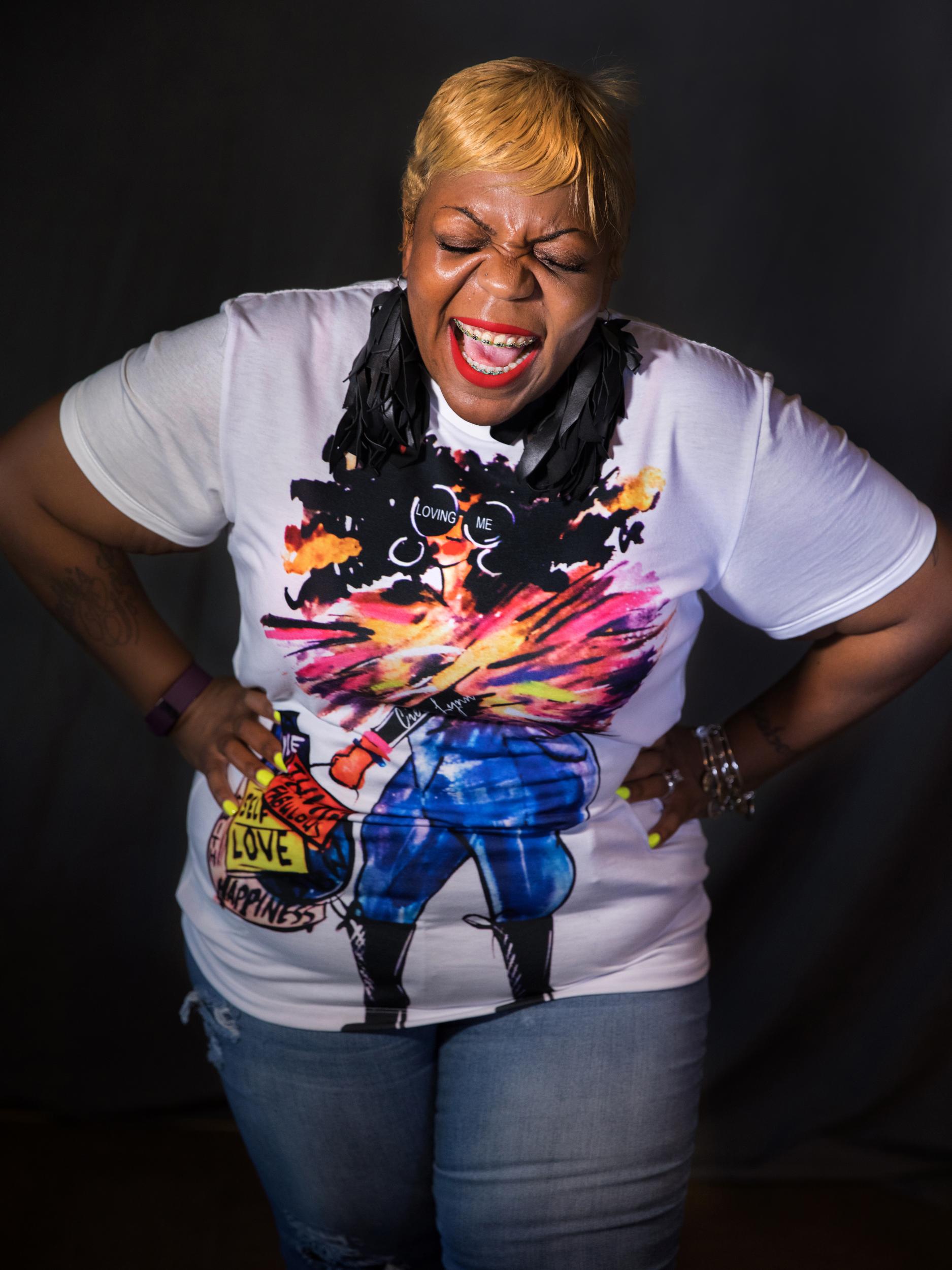Want to raise an empowered girl? Then let her be funny

Your support helps us to tell the story
From reproductive rights to climate change to Big Tech, The Independent is on the ground when the story is developing. Whether it's investigating the financials of Elon Musk's pro-Trump PAC or producing our latest documentary, 'The A Word', which shines a light on the American women fighting for reproductive rights, we know how important it is to parse out the facts from the messaging.
At such a critical moment in US history, we need reporters on the ground. Your donation allows us to keep sending journalists to speak to both sides of the story.
The Independent is trusted by Americans across the entire political spectrum. And unlike many other quality news outlets, we choose not to lock Americans out of our reporting and analysis with paywalls. We believe quality journalism should be available to everyone, paid for by those who can afford it.
Your support makes all the difference.Laurie Menser was a 7- or 8-year-old in Rockville, Maryland, when she wandered over to a neighbor's house one day, slipped a glass eye in her mouth and got the attention of the grown-ups in the room. Then she smacked the back of her head and stuck out her tongue - waiting for laughs.
“They were appalled,” she remembers. “They were like, 'You need to go home right now and tell your dad what you did.' ”
The neighbors didn't know that it was Menser's father who'd picked up the fake eye at a yard sale and taught his daughter the gag. Don't worry, he told her, “they just don't get the joke.”
Looking back, Menser wonders how the episode might have gone had one element been different: What if she were a boy? Would they have laughed then?
“I think probably the neighbor would have told the little boy, 'Hey, that's gross and weird and don't do that anymore,' ” she says. “Whereas I got, 'This is appalling.' ”
Menser is 38 and a director of development at a science association. She has scaled the corporate ladder and is respected in her field. And she thinks that, more than anything, her success has been driven by her sense of humor. She just had to ignore all the voices telling her not to use it.
“There was an expectation that girls would be quieter. And wouldn't ruin their dresses and wouldn't be roughhousing and cracking jokes in church,” she says. “And I was very often doing a lot of those things,” thanks in part to her father's encouragement to let her be what she was: Funny.

Today we encourage our daughters to be ambitious and athletic, opinionated and outspoken. We want them focused on STEM and outfitted in T-shirts that read, “Who runs the world? Girls.”
But what if raising truly empowered girls also means raising funny ones? What if we teach our daughters that humor is their turf - just as much as any boy's?
“One of the things that happens to girls is that they are encroached upon by the world,” says Lisa Damour, a psychologist and author of “Untangled: Guiding Teenage Girls Through the Seven Transitions Into Adulthood.” “And one of the things that humor can do is . . . help girls stand up for themselves in ways that people don't retaliate for.”
There's an abundance of research on the social advantages that come with a strong sense of humor.
Humor conveys intelligence. Funny people are seen as more confident and competent. The ability to crack a joke shows social ease and can turn awkward elevator silence into a golden moment of human connection.
“It can actually shift perspective of status - and by status what we mean is respect, influence and admiration,” says T. Bradford Bitterly, co-author of a new Wharton business school study on the use of humor in professional settings. His research found that people who effectively used humor were more likely to be elected to leadership positions.
This is something we want for our girls, yes? To not just be smart and confident, but to be able to convey those qualities in boardrooms, at dinner parties and while standing at a lectern?
- - -
Of course girls are funny. Caroline Nugent remembers asking her father why people were always laughing at things she said. “It's called wit,” he told her. As a little girl, she played it up, reveling in the attention. Nugent is 13 now, smart, self-aware and so enamored of Tina Fey that she recently spent two weeks at a Second City comedy camp.
Still, these days she isn't that comfortable cracking jokes around boys or adults she doesn't know well.
“I feel like when boys make jokes that are edgy, they get more praise for it, but since women are stereotypically dainty and quiet, especially in the past, they aren't as encouraged to be funny,” says Nugent, an eighth-grader at the Sheridan School in Washington. At school, she adds, “when one of the girls tries to make a joke, the boys are like, 'Why are you talking?' ”
Caroline's humor leaves her mom, Dana, “bent over laughing with tears coming out of my eyes.”

“To me, being funny, being witty, is brilliant,” Dana says. “I don't want to see her lose that.”
Peter McGraw, director of the Humor Research Lab at the University of Colorado, thinks that, empirically speaking, women are just as funny as men.
“When you actually measure a woman and a man's ability to be funny in the laboratory, you create an even playing field - you remove the social pressures,” he says. “Women are just as good at this stuff as men are.”
But when Robert Provine, a neuroscientist at the University of Maryland in Baltimore County, camped out at food courts and campus quads documenting instances of laughter, he found that men got the most laughs.
“Both men and women are more likely to laugh if a male is talking to them,” says Provine, author of “Laughter: A Scientific Investigation.”
McGraw concludes that there is something societal going on, not biological. And it comes down to risks and rewards. Every crack at humor involves risk - the joke could fall flat. Women may not see as much upside, even when they land the joke.
“Are women differentially rewarded or punished for breaches of social and cultural norms? If the answer to that question is yes, which I believe it is, you can see how that would tamp down the likelihood that women would try to be funny,” he says.
- - -
Natalie Sellman has heard stories that as a kid, her mother was a funny girl with a loud laugh. But she has never known her that way. In fact, Natalie's mom told her that her own mother didn't approve, often saying: “You laugh like a hyena. Women aren't supposed to laugh like that.”
Sellman, a 36-year-old medical assistant from District Heights, Maryland, received some of the same messages. So she kept her jokes to herself in adolescence. “Do I continue to be who I am?” she remembers wondering. “Or do I slow down just a little bit to fit in with the crowd?”
She slowed down. Piped down. A lot of girls do.
“You get your period and you start laughing only in the girls' room,” explains Gina Barreca, a professor at the University of Connecticut who writes extensively about women and humor. “It gets put in the kitchen. It gets put in the women's room - single-sex environments.”

Why does this happen just as boys and girls start to get romantically interested in one another? Evolutionary biologists offer a prevailing theory: Humor indicates intelligence, which indicates a higher likelihood of gainful employment, and thus the ability to keep future offspring well fed. Cave women may have looked for physical brawn in mates, but modern ladies seek smarts - so for guys, cracking jokes at a cocktail party is a good way to peacock IQ points.
But McGraw argues that by stunting women out of expressing their humor in mixed company, we're shortchanging everybody.
“People really do want the women in their life to be funny,” he says. “Funny people are better company. They make the world an easier, more enjoyable place.”
That's what Sellman ultimately decided. By the end of high school, she didn't care what people thought anymore. Today she laughs as loud as she wants and tries to get everyone - including her two daughters and the dozens of patients she sees every day - to do the same. “People will say to me, 'You made my day,' ” she says.
- - -
Barreca thinks the reason girls often suppress their humor in adolescence is that “it's seen as alpha behavior. Someone holding the mic or getting the last word is not displaying traditional feminine behavior. A good girl doesn't make anybody uncomfortable. Doesn't take up too much space.”
But our ideas of “traditional feminine behavior” are always evolving. It wasn't that long ago that athleticism wasn't considered feminine. Now we almost require it.
So how does a parent cultivate humor in girls? “Modeling it,” says Damour. “Being playful. Seeing it as a tool set like any other, that can be fostered.”
Praise attempts at humor. Combat messages that diminish it. Encourage our sons to value humor in their girlfriends and girl friends. And their moms.

And lift up the women who do it. It matters that so many funny women are working at the top of their game today. It means our girls get to study the ways of Issa Rae, Amy Poehler, Mindy Kaling, and YouTube stars such as Liza Koshy and Lilly Singh.
In the three decades since Menser stuck that eyeball out, she has realized how crucial humor has been to her life. She spends a lot of time interacting with doctors and executives, giving presentations to male-dominated audiences. “I'm very smart, but if I sat down at a table and gave a bunch of men a bunch of facts, I don't know if they would sit here and say, 'Please, continue.' But if you make . . . jokes that make them laugh,” she says, “you can usually get them to say: 'You should stay. We want to hear what you have to say.' ”
Recently, Menser's 8-year-old niece said she was glad that Menser was her godmother, because she's “funny and adventurous.”
“And I said, 'So are you,' ” Menser recalled. “She recognized that that's something valuable about me, and I want her to know that to me, that's valuable about her. Because I see that there's value there. I don't know that everybody realizes how far being funny can get you, but it helps. It helps a lot in life.”
Join our commenting forum
Join thought-provoking conversations, follow other Independent readers and see their replies
Comments